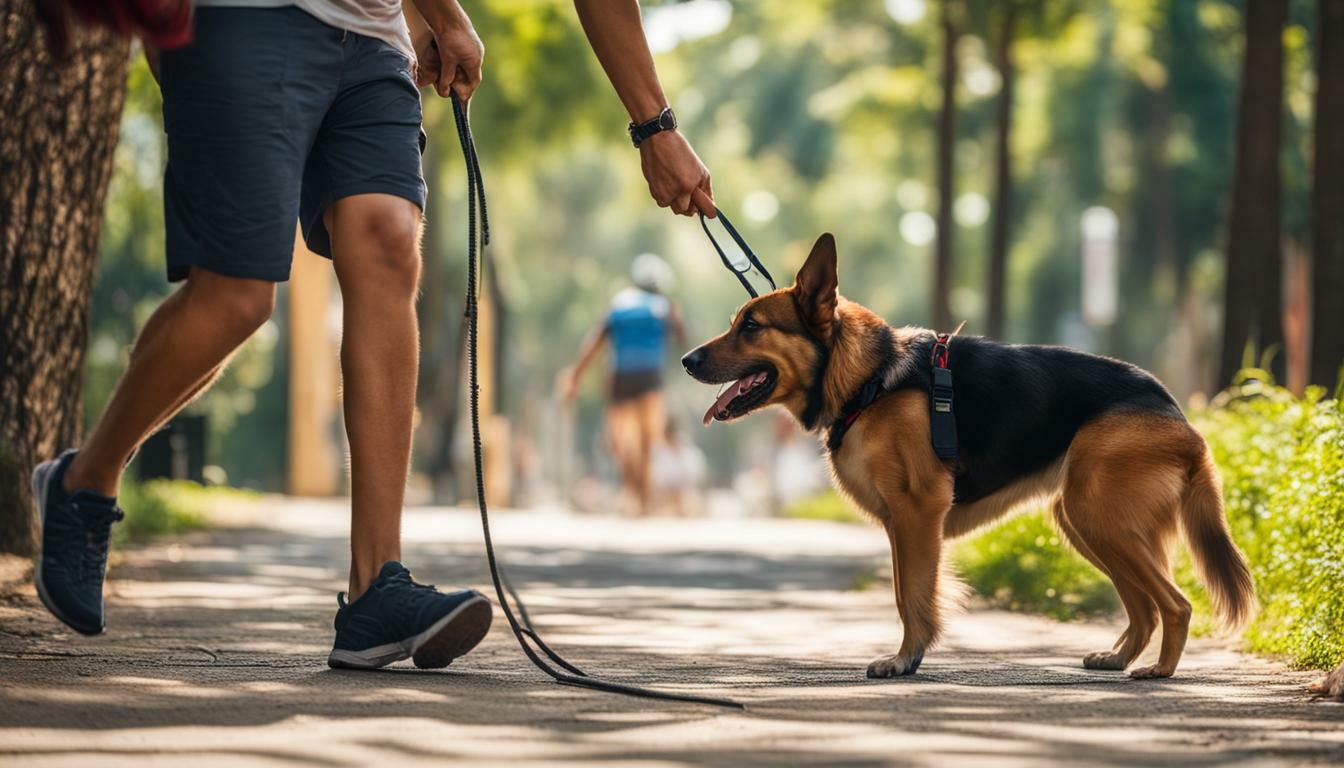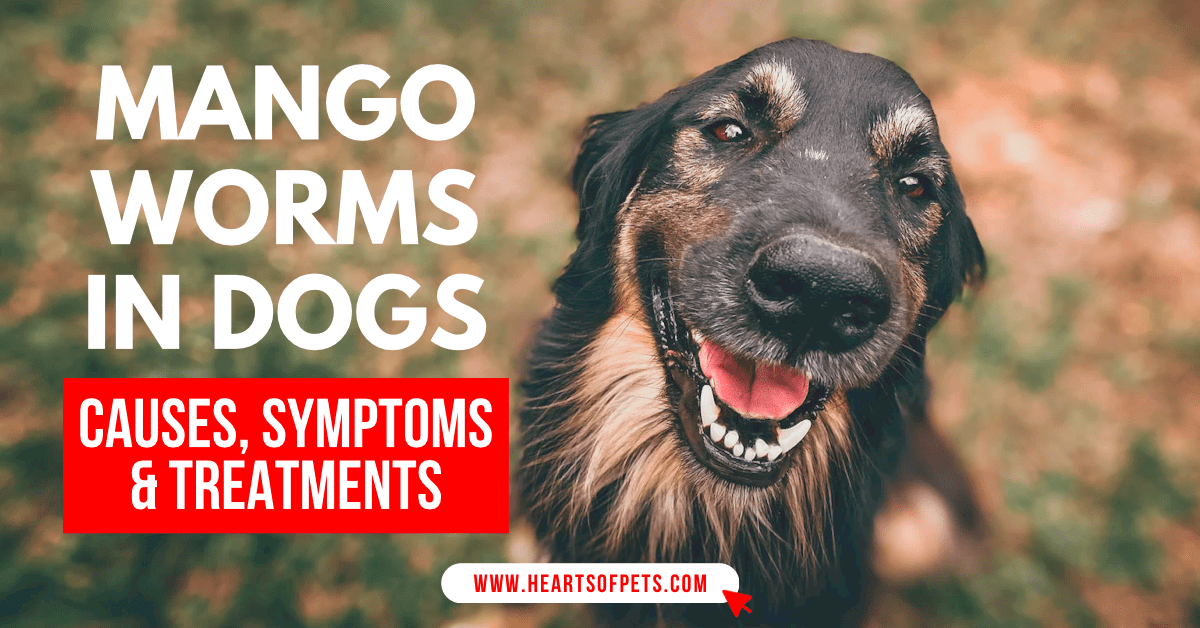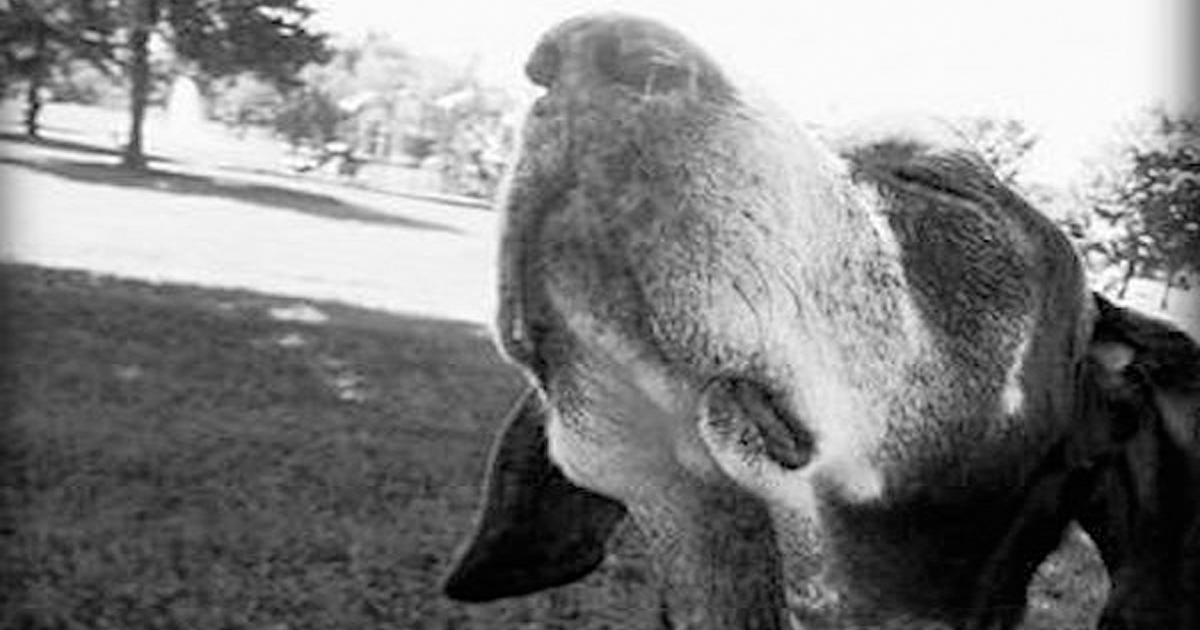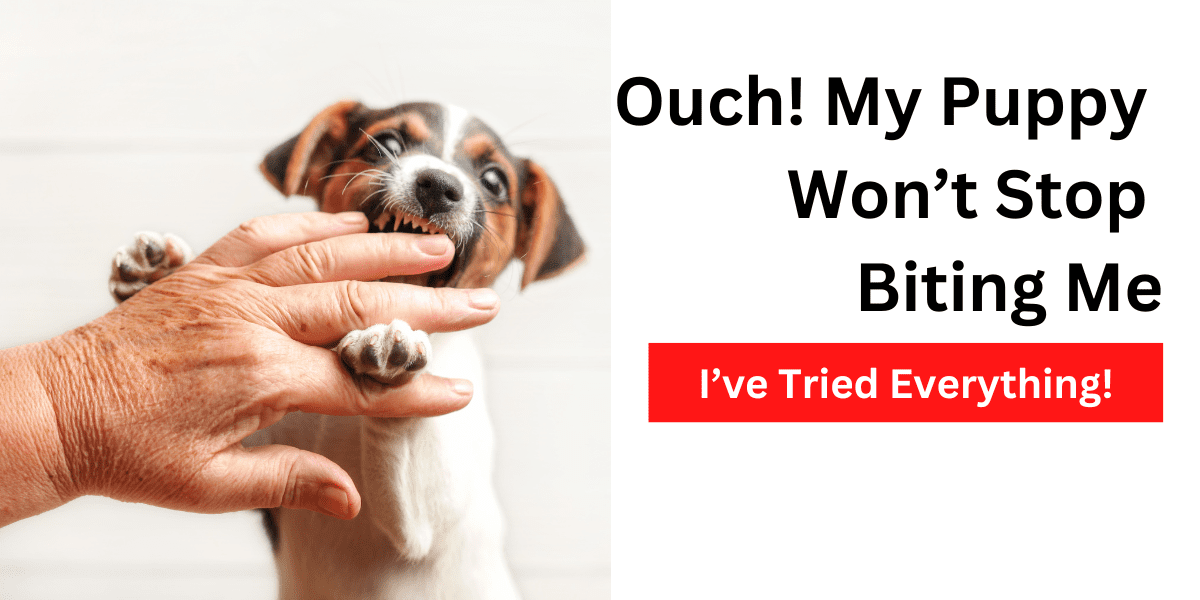
It’s normal for puppies to want to bite and chew on things. After all, they’re teething, exploring the world and their own mouths. However, it’s not so fun when your puppy’s biting turns on you. If your puppy won’t stop biting you, even after you’ve tried everything, don’t worry. There are still a few things you can do.
Why is My Puppy Almost Bite Everything?
The Teething Process
One of the main reasons puppies bite is because they’re teething. When puppies are born, they have no teeth. Then, around 3-4 weeks of age, their baby teeth start to come in. This process generally continues until they’re about six months old when they should have a complete set of adult teeth.
The teething process can be painful for puppies, so they may try to soothe their gums by chewing on anything they can get their teeth on. This is why it’s important to have lots of chew toys available for your pup during this time. You may even want to give them a frozen washcloth or ice cube to gnaw on; the cold can help numb the pain and discomfort from teething.
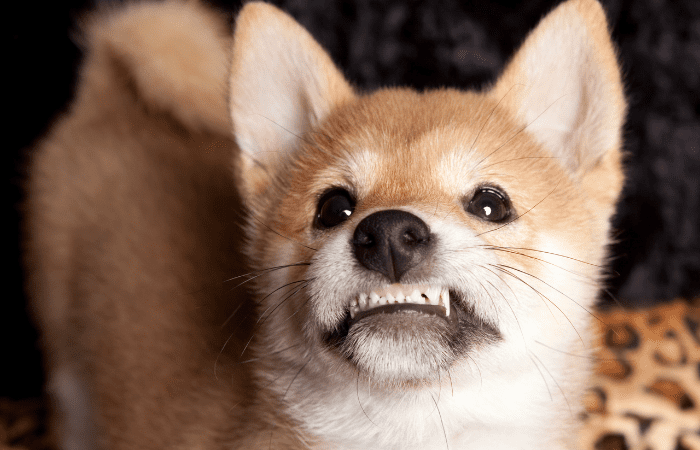
Boredom and Lack of Exercise
Another common reason puppies bite is boredom or lack of exercise. Puppies have a lot of energy, and if they’re not given an outlet for that energy, they may become frustrated or restless. This is why it’s essential to ensure your puppy is getting plenty of exercises every day. A good rule of thumb is at least one hour of exercise per day, broken up into a few shorter walks or play sessions throughout the day.
In addition to physical exercise, puppies also need mental stimulation to stay happy and healthy. This can come in training exercises (such as learning tricks), puzzle toys filled with treats, or even simple games like fetch.
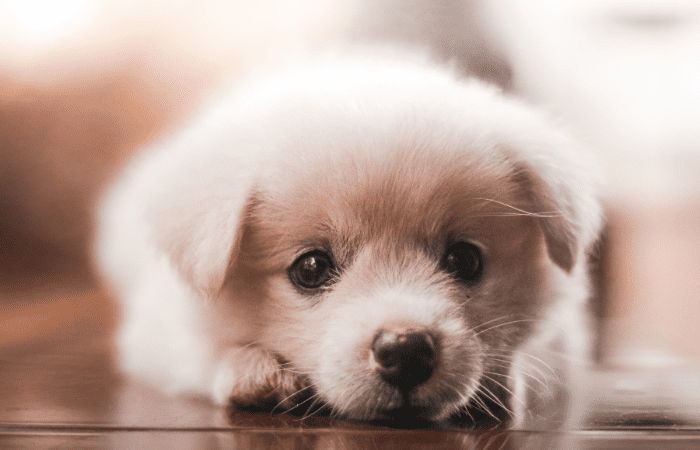
Nipping Nervousness in the Bud
Sometimes, puppies bite out of nervousness or fear. This may be why you notice your puppy biting more when they’re around new people or situations. The best way to combat this biting is through socialization; exposing your puppy to as many different people and situations as possible in a positive way will help them become more confident and less likely to bite out of fear.
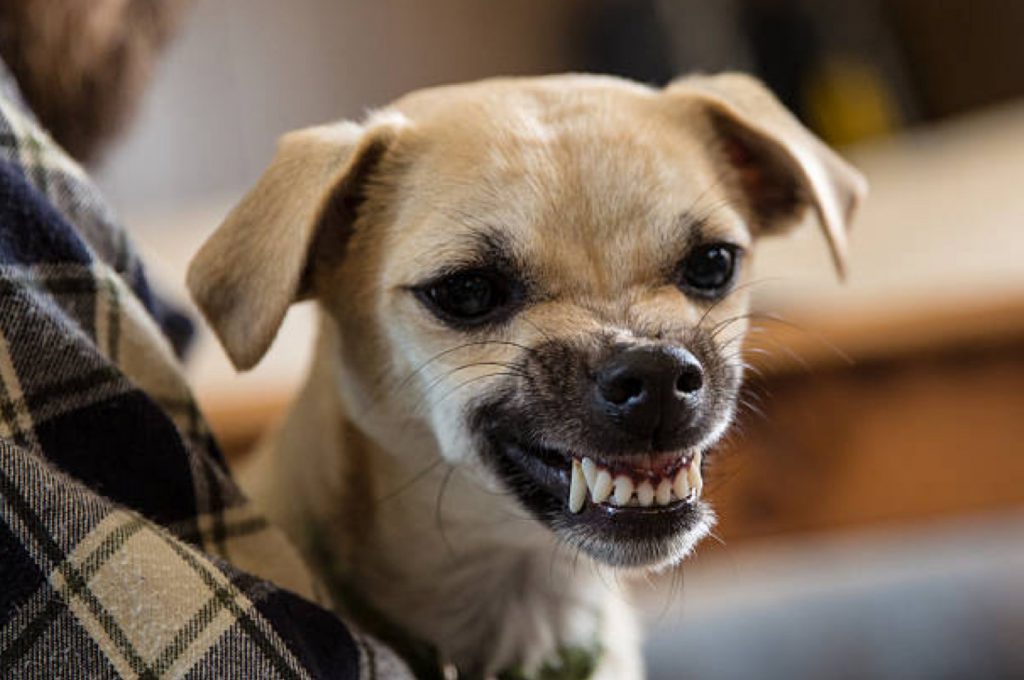
They’re Playing
Puppies like to play by biting because it’s fun! Although it may not seem like it, when puppies are playing with each other, they’re practicing important social skills. If you don’t want your puppy to bite while playing, you can teach them the “leave it” command. This will come in handy later when they’re older and you don’t want them getting into trouble!
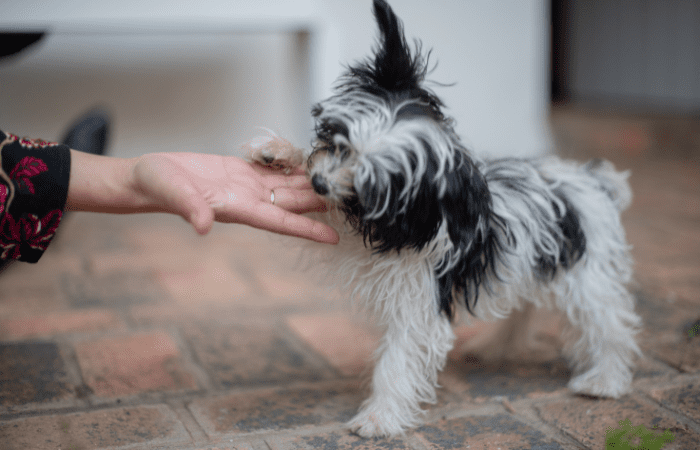
They’re Excited
Puppies get excited quickly, and sometimes they can’t help but express it by biting. If your puppy is getting too excited, try to calm them down by petting them or speaking in a soothing voice. You should also avoid roughhousing with your puppy, making them more enthusiastic and more likely to bite.
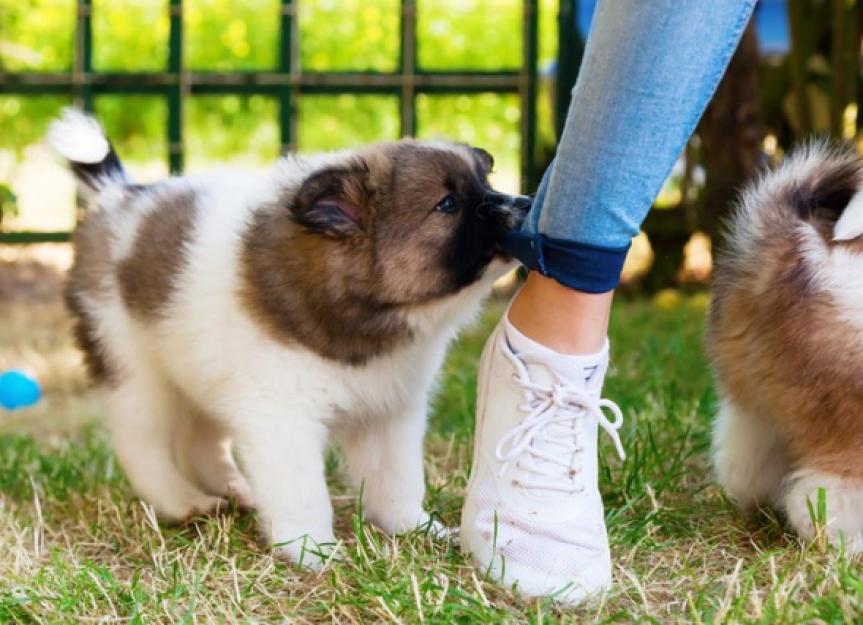
10 Ways To Stop Puppy Biting
1. Socialization
One of the most important things you can do for your puppy is to socialize them. Socialization is positively exposing your puppy to various people, places, and experiences so that they grow up to be well-rounded dogs. A well-socialized puppy is less likely to bite because it will have learned how to interact with people and other animals safely and appropriately.
First Step
Introduce them to as many new people as possible. This can be done by taking them on walks in your neighborhood or to the dog park. Have friends and family visit so your puppy can get used to being around different types of people. You must ensure everyone is comfortable around each other and that your puppy is not getting too much attention or overwhelming anyone.
Second Step
Expose your puppy to new places and experiences. This can be done by taking them on car rides, going for hikes, or visiting different places like the beach or the park. You must make sure your puppy has positive experiences and that they are not getting too tired or overwhelmed.
Third Step
Continue socializing your puppy as they grow older. This means regularly exposing them to new people, places, and experiences. It’s also important to continue training your puppy so that they learn how to behave appropriately around people and other animals. A well-socialized dog is a happy dog!
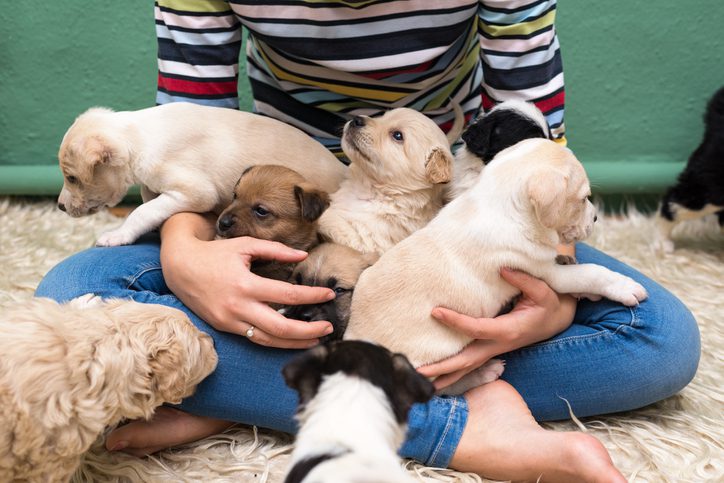
2. Training Exercises
You first need to provide your puppy with an appropriate outlet for his chewing behavior. This means giving him plenty of chew toys he can gnaw on without damaging your belongings. If your puppy does start chewing on something he shouldn’t, say “no” in a firm voice and give him one of his chew toys instead. With consistent training, your puppy will learn that he’s only allowed to chew on his toys and not on your furniture or other household items.
In addition to providing appropriate outlets for your puppy’s chewing behavior, you’ll also need to teach him how to control his mouth. Start by teaching him the “leave it” command. This is an important command that will come in handy in various situations – not just when trying to stop your puppy from biting. Once your puppy has mastered the “leave it” command, you can start using it when he starts biting. For example, if he starts nibbling on your hand, say “leave it” and then offer him one of his chew toys instead.
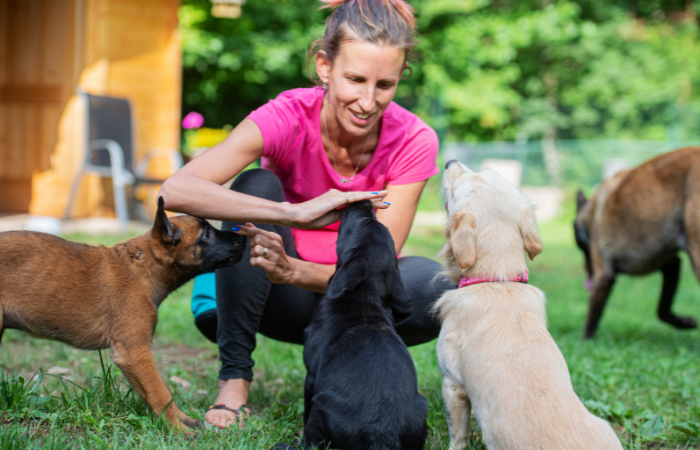
3. Chew Toys
Chew toys can help redirect a pup’s attention from your hands and legs to something that is okay to bite. These four options are the best chew toys to stop puppy biting.
Nylabone DuraChew Wishbone
This wishbone-shaped chew toy is perfect for pups who love to gnaw. Its durable nylon can stand up to even the most aggressive chewers. The textures on the toy also help massage a puppy’s gums and clean their teeth as they bite down.
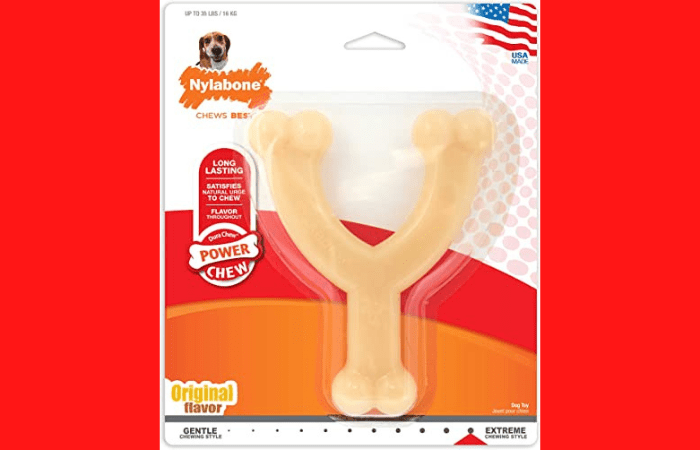
KONG Classic Dog Toy
The KONG Classic is perfect for pups who need an outlet for their energy. It can be filled with treats or peanut butter to keep your puppy entertained and focused on getting the food out of the toy instead of biting you. It’s also bouncy and fun to play fetch with!
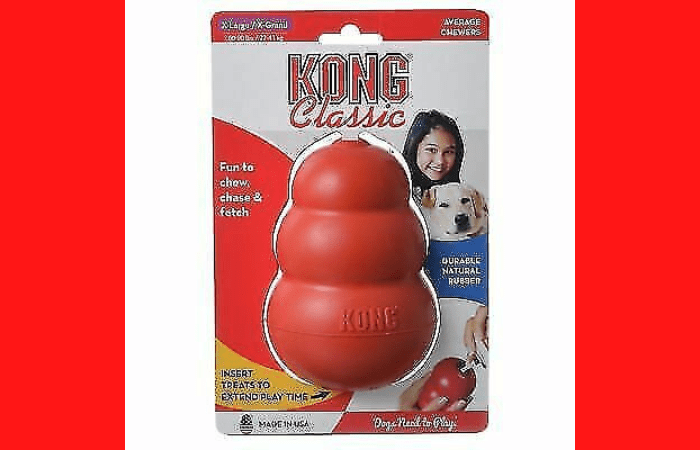
GoughNuts TuG Maxx Stick
This rubber stick toy is perfect for teething puppies. It’s easy to hold and carry, and the rubber material is safe for puppies to gnaw on. Plus, if your pup bites down too hard and punctures the toy’s surface, GoughNuts will replace it for free!
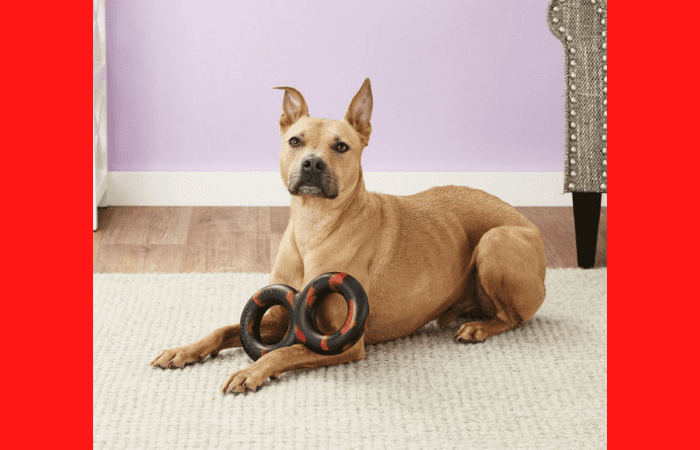
Benebone Real Flavor Wishbone Chew Toy
This chew toy is made of nylon and flavored with real chicken, bacon, or peanut butter (your pup’s choice!). The flavor helps keep pups interested in the toy, and the durable nylon material can withstand some serious chewing.
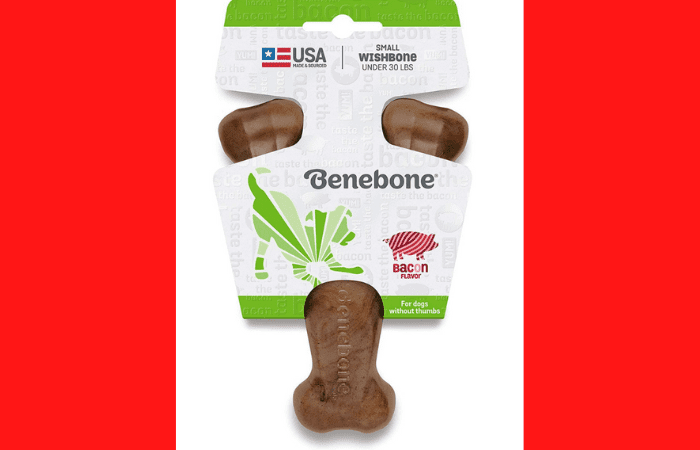
4. Exercise
One of the best ways to stop your puppy from biting is to give them plenty of exercises. A tired puppy is a good puppy! Here are some tips on how to help your puppy burn off that extra energy, so they’re less likely to bite.
Set aside at least 30 minutes per day for playtime.
This may seem like a lot, but puppies have a lot of energy to burn! If you can’t commit to 30 minutes all at once, that’s okay. Just break it up into shorter periods throughout the day. Fifteen minutes in the morning, 15 minutes in the evening, and a longer play session on the weekend should do the trick.
Get creative with your playtime activities.
Exercise doesn’t have to be boring! You can play tons of fun games with your puppy to help them get their energy out. Of course, fetch is always a popular option, but you can also try hide and Seek, tug-of-war, or even just running around in the backyard together. Again, variety is vital – if your pup gets bored with one activity, they’re less likely to want to keep playing.
Take your pup for walks around the neighborhood.
Not only is this great exercise for your puppy, but it’s also a great way to socialize and explore their surroundings. Just be sure to start with short walks and gradually increase the distance as your pup gets more comfortable walking on a leash. You don’t want them getting too tired too fast!
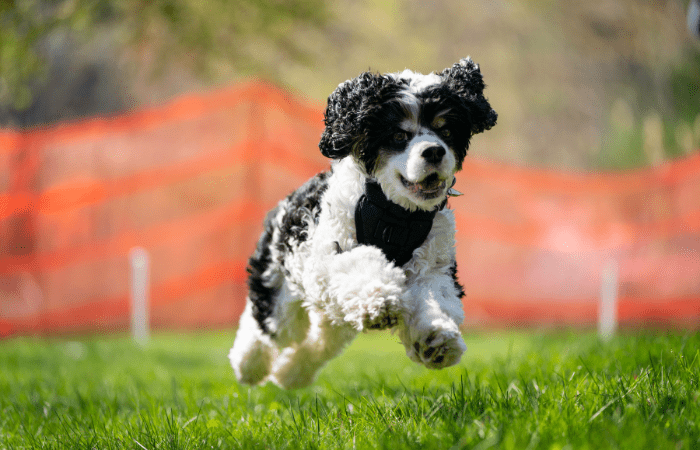
5. Mental Stimulation
Mental stimulation is anything that engages your puppy’s mind. This could be things like puzzle toys, training exercises, or even just simple games like fetch. The goal of using mental stimulation is to tire your puppy out mentally so that they are less likely to bite out of boredom or frustration.
There are two main ways that you can use mental stimulation to stop your puppy from biting:
- As a form of exercise
- As a form of entertainment
Using mental stimulation as a form of exercise is a great way to tire your puppy out physically and mentally. This could involve things like playing games of fetch or tug-of-war. Not only will your pup get some much-needed physical activity, but they’ll also have to use their brain power to figure out how to win the game. As a result, they’ll be less likely to resort to biting later on.
Another way to use mental stimulation is as a form of entertainment. This could involve giving your pup puzzle toys filled with treats or teaching them basic obedience commands like sit, stay, and come. Not only will this provide them with some much-needed mental stimulation, but it will also help build up their confidence and strengthen the bond between you and your pup.
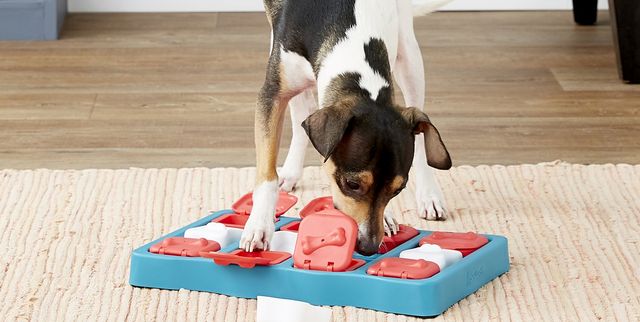
6. Positive Reinforcement
You will need a few things to effectively use positive reinforcement to stop your puppy from biting: treats, patience, and consistency.
The first step is to have your puppy on a leash. This will give you more control and prevent him from running off if he gets too excited. Next, offer him a treat and wait for him to take it from you. If he bites you, quickly move your hand away and say “no.” Repeat this process until he understands that he will only get the treat if he takes it gently.
It is important to be patient during this training process. Puppies learn at their own pace, and some may pick up the concept of gentle biting faster than others. Just keep working with your pup; eventually, he will get it!
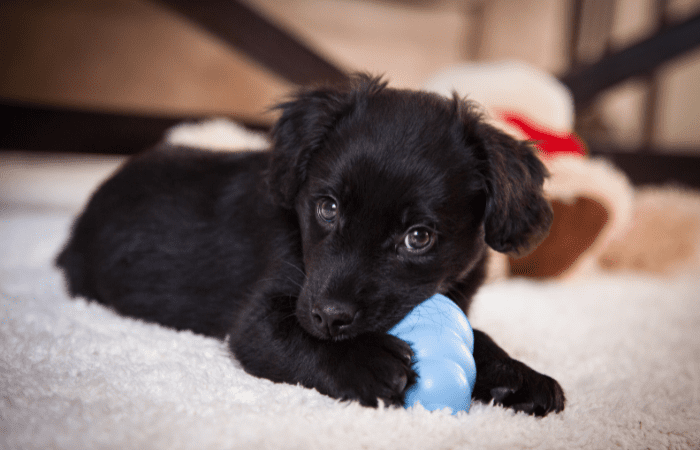
Finally, be consistent with your commands and rewards. If you only give treats sometimes when he bites gently, he will get confused and won’t understand what you want him to do. Always provide pleasure immediately after he takes something gently from you so that he knows that is the behavior you are looking for.
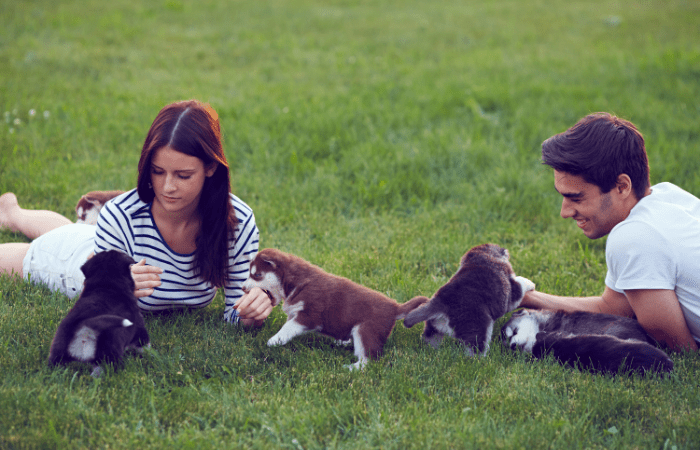
7. Ignore bad behavior
The best way to stop puppy biting is by ignoring the bad behavior. For example, when your puppy bites you, don’t scream or hit them. This will only make them more excited, and they will continue to bite. Instead, calmly get up and walk away from them. They will eventually get bored and stop biting.
If your puppy continues to bite, you can try saying “no” in a firm voice. This will let them know that you don’t like what they’re doing. You can also try holding their muzzle closed for a few seconds. This will give them a taste of what it feels like to be bitten, and they will hopefully learn not to do it themselves.
In addition to ignoring bad behavior, you should praise your puppy when they behave well. For example, treat them and pet them when they aren’t biting. This will let them know that this is the behavior you want from them.
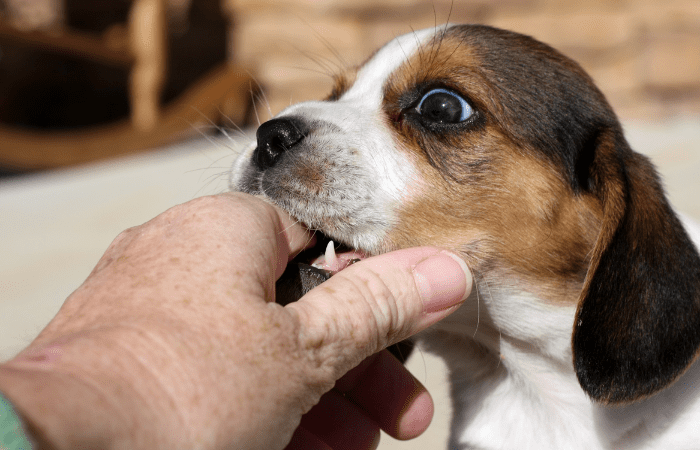
8. Timeouts
The timeout method is based on positive punishment, meaning an unpleasant consequence is delivered after an undesirable behavior is displayed. In the case of puppy biting, the unpleasant result is being isolated from people and other animals for a short period.
When using timeouts, it’s important to be consistent. For example, every time your puppy bites, you should immediately remove him from the situation and place him in his crate or another room by himself for about 30 seconds to one minute. You should also avoid speaking to him or making eye contact until he calms down.
It’s important to note that timeouts should only be used for behaviors that occur at the moment, such as biting. For example, if your puppy bites and you put him in his crate an hour later, he won’t understand why he’s being punished, which will only confuse him.
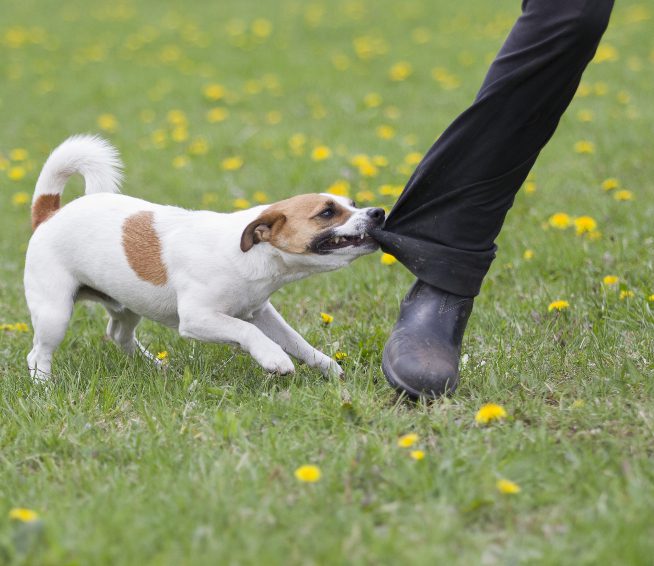
When Not to Use Timeouts
Although the timeout method can effectively stop puppy biting, there are some situations when it’s not appropriate. For example, if your puppy bites out of fear or anxiety, punishing him with a timeout will only make the problem worse. In cases like these, it’s best to consult a professional trainer or behaviorist who can help you address the root of the problem.
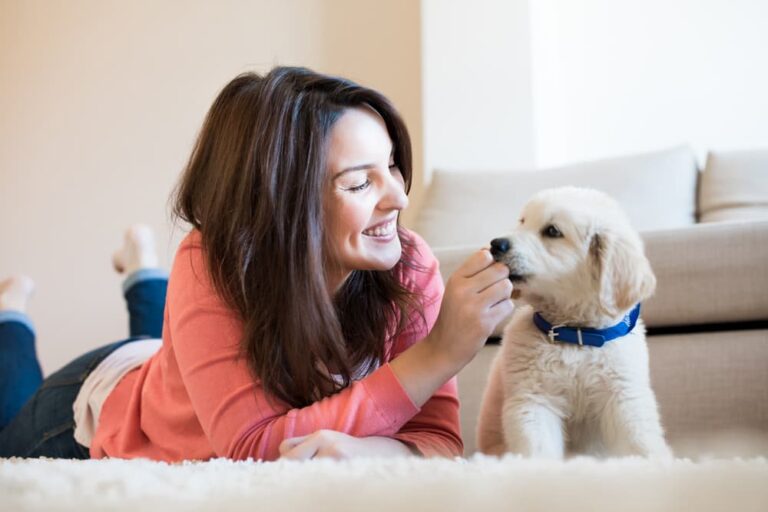
9. Redirection
Redirection works by giving your puppy something else to focus its energy on. For example, your pup starts to nibble on your hand. Instead of pulling away and punishing your dog, you would give it a chew toy to hold onto. By redirecting its attention to the toy, you’re teaching your puppy that biting isn’t acceptable behavior.
It’s important to note that redirection should only be used as a temporary measure. Once your puppy is no longer biting, you should phase out the chew toys and other objects you used for redirection. Otherwise, your puppy may become overly dependent on them and start using them as a crutch.
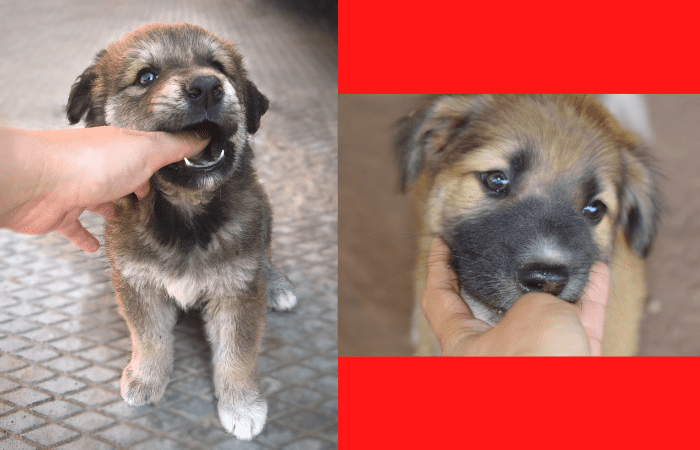
When to Use Redirection
Redirection is most effective when used early and often. Therefore, the sooner you start using this training technique, the better your chance of curbing your puppy’s urge to bite. However, even if you didn’t start using redirection from the get-go, there’s still hope! You can still use this technique to stop your puppy from biting—it just might take a little longer to learn which behaviors are acceptable and which aren’t.
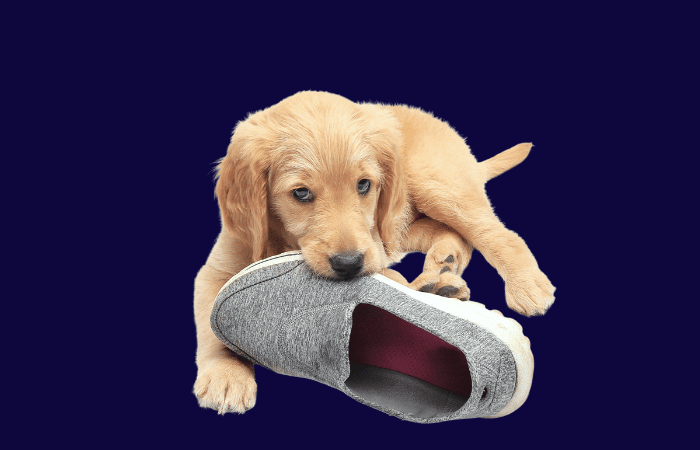
10. Be Consistent
It’s also important to be consistent with your commands and expectations when training your puppy not to bite. For example, suppose everyone in the household responds differently when the puppy bites (e.g., one person says “ouch” while another laugh). It will only confuse the pup and make it harder to break the biting habit. Therefore, it’s vital that everyone who interacts with the puppy uses the same commands (e.g., “no,” “ouch,” etc.) and gives verbal cues at the same time (e.g., saying “no” while gently pushing the pup away).
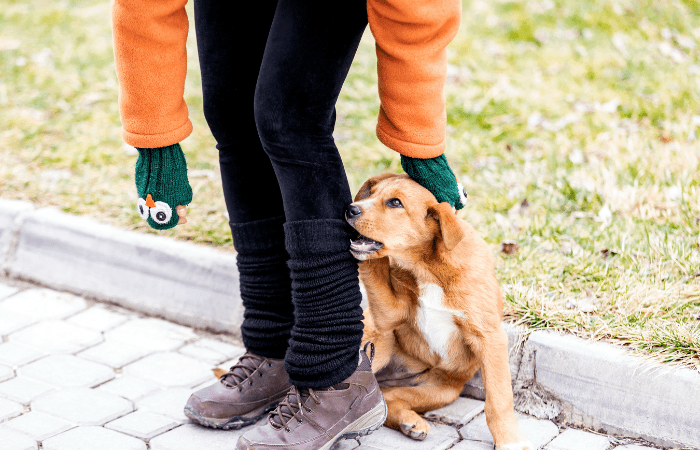
Is Puppy Biting a Puppy Play or Aggression?
One way to tell the difference between puppy play biting and aggression biting is the body language of the puppies involved. When puppies play, they will often be in a relaxed, upright position with their tails wagging. Their mouths may be open, but their teeth will not be bared. On the other hand, puppies who are feeling aggressive will often have their hackles raised and their teeth bared. In addition, their bodies will be stiff, and they may growl or snarl.
Another way to tell the difference between puppy play biting and aggression biting is the context in which the biting is taking place. For example, puppy play biting is usually initiated during periods of social interaction, such as when two puppies are playing together or when a puppy is being petted by its owner. Aggression biting, on the other hand, is usually motivated by fear or territoriality. For example, a puppy feeling scared or threatened may lash out and bite to defend itself. Similarly, a puppy who thinks its territory is being invaded may bite to protect its home.
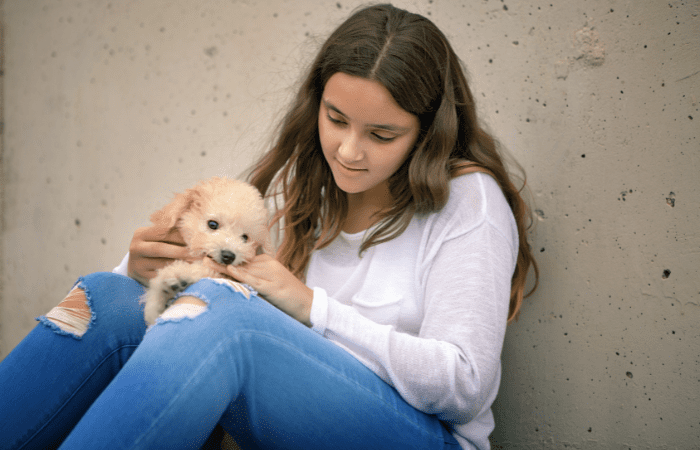
What can you do about it?
If you catch your puppy in the act of playful nipping, say “ouch” in a high-pitched voice and immediately walk away from them. This will let them know that their behavior is not acceptable. Once they have calmed down, you can approach them again and continue playing. If they start nipping at you again, repeat the process.
It is essential to remain consistent with this behavior so your puppy knows nipping is not tolerated.
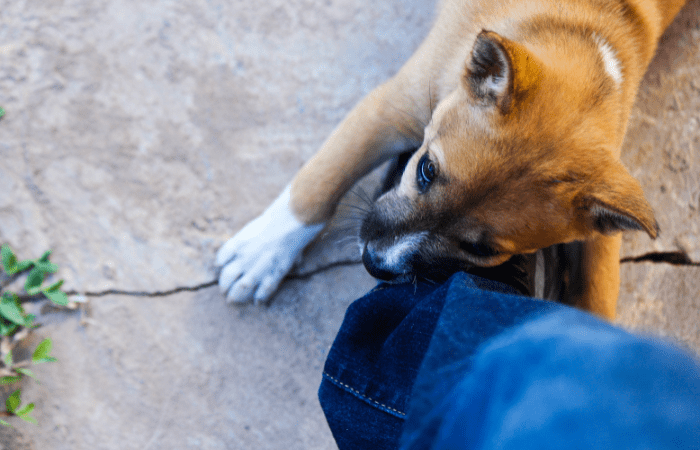
Is Your Puppy Biting Too Much?
- Your puppy is biting harder than it used to.
- Your puppy is biting more often than it used to.
- Your puppy is starting to draw blood when they bite.
- You can’t get your puppy to stop biting no matter what you do.
- You’re afraid of your puppy because they bite.
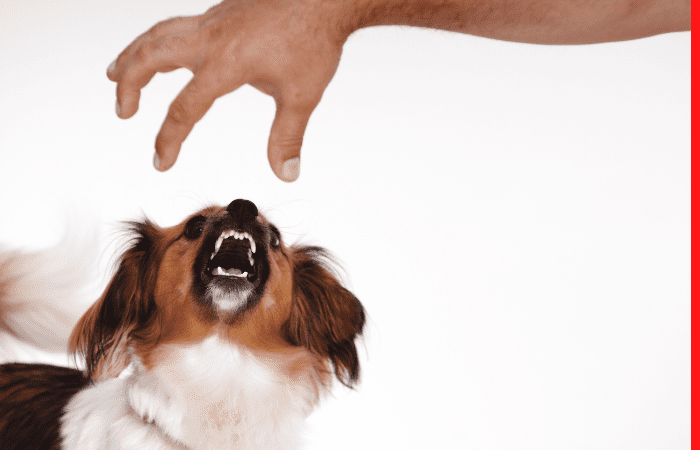
How Long Does Puppy Biting Last?
Most puppies start to teethe between 3 and 6 months old. This is when they start losing their baby teeth and getting their permanent ones. The teething process is painful for puppies (and humans, too!), and they often look for things to chew on to help ease the pain. That’s why many puppies start biting during this time.
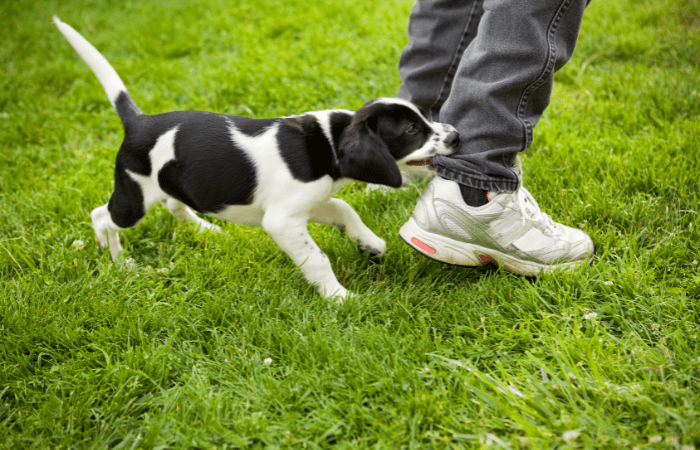
My Puppy Still Keeps Biting! So how Can I Prevent My Puppy From Biting Me?
1. Establish rules and boundaries from the beginning. Be consistent in what you do and don’t allow your puppy to do. For example, don’t let him up there even once if you don’t want him on the couch. If you don’t want him in your bedroom, close the door.
2. Teach your puppy “no bite” or “gentle.” Dogs learn by association, so whenever your puppy bites you, say “no bite” or “gentle” in a firm voice. Then provide him with an acceptable alternative such as a chew toy or bone.
3. Redirect his attention when he starts to mouth or bite you. If you see that your puppy is getting ready to chomp down on your hand, quickly provide him with an acceptable alternative, such as a chew toy or bone.
4. Ignore him when he bites you. This requires a fair amount of self-control, but if you react (even if it’s just to move your hand away), you’re reinforcing the biting behavior. So, keep your hand still until he lets go, then walk away or turn your back on him for a few seconds until he calms down.
5. Puppy-proof your home. Don’t leave small objects around that he might mistake for toys, and remove anything poisonous or harmful from his reach. A safe environment will help prevent frustration-induced biting behaviors. Here are some additional tips:
- Get rid of poisonous plants to dogs, such as lilies, azaleas, and tulips.
- Keep all medications, cleaning supplies, and hazardous materials locked up and out of reach.
- Make sure there are no loose wires or cords that your puppy could chew on.
- Block off any areas of your home that you don’t want your puppy to access, such as the kitchen when you’re not home or stairways.
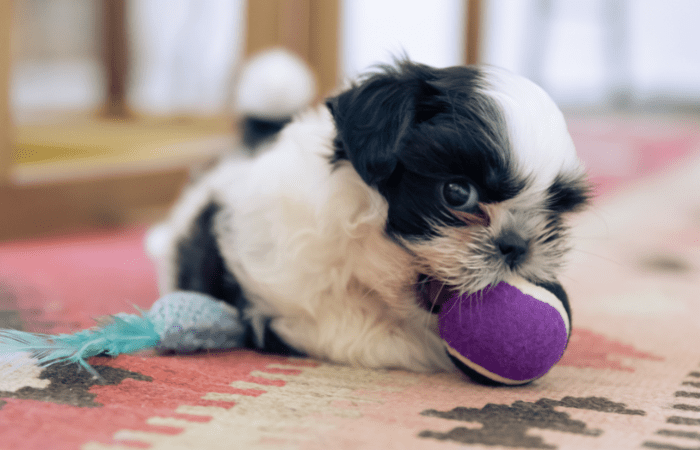
Final Thoughts
Puppy biting is a normal and necessary part of the teething process. However, it’s important to nip this behavior in the bud (pun intended!) before it gets out of hand. By establishing rules and boundaries from the beginning, teaching your puppy “no bite” or “gentle”, and redirecting his attention when he starts to mouth or bites you, you can prevent your puppy from biting you. Puppy-proofing your home will also help to create a safe environment for your pup.
If you’re struggling to get your puppy to stop biting, contact a professional trainer or behaviorist for assistance. With consistency and patience, you’ll be able to train your puppy not to bite successfully.
Frequently Asked Questions
Why does my puppy go crazy and bite me?
Nipping is typical puppy behavior, despite the fact that it might be bothersome. Puppies do this to entice you to connect with them. When your puppy nips, any attention you give him is gratifying, and you may even appear to be participating in the game with him.
Why will my puppy not stop biting me?
Numerous pups are accustomed to rough play with their sibs, and biting is sometimes an effective tactic for puppies to get attention or start playing with their siblings. However, pups frequently chew on items like furniture, legs, arms, and shoes when their curiosity is combined.
Why is my puppy so hyper and biting everything?
The good news is that mouthing and puppy biting is overwhelmingly common and quite typical for several reasons: Puppies use their lips to investigate their environment. Then, they endure a painful teething procedure for two to three months.
Is it my fault my dog bit me?
Dog owners in the state of California are strictly accountable for dog bites. No matter the dog’s past, the owner is responsible for the dog’s behavior.

